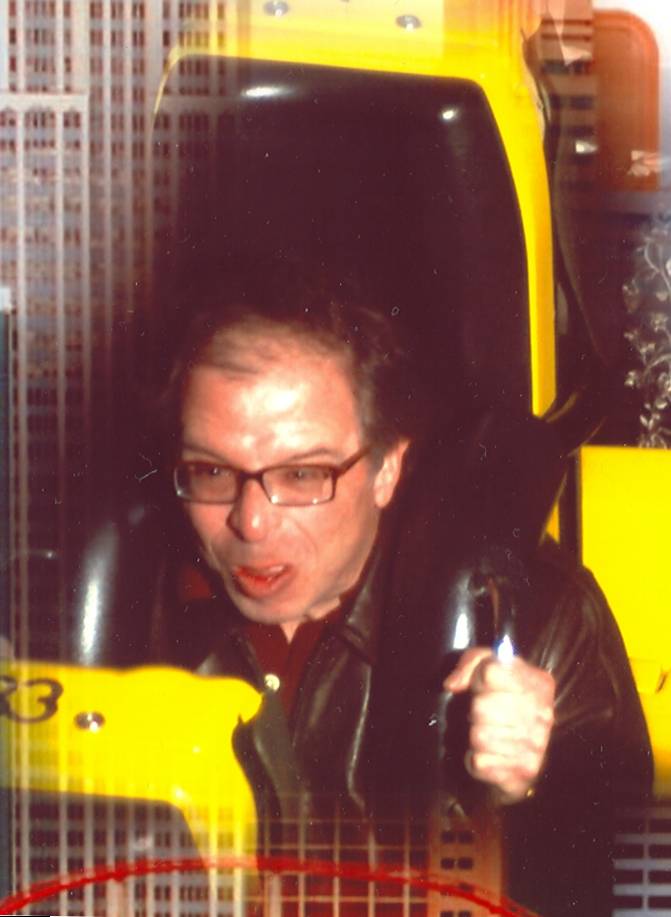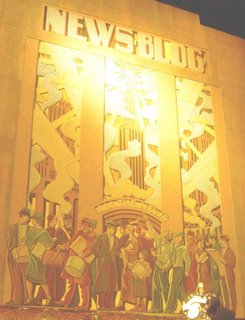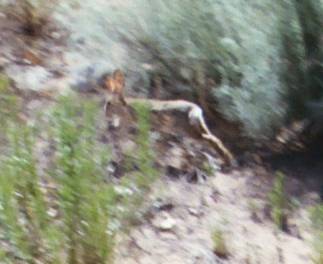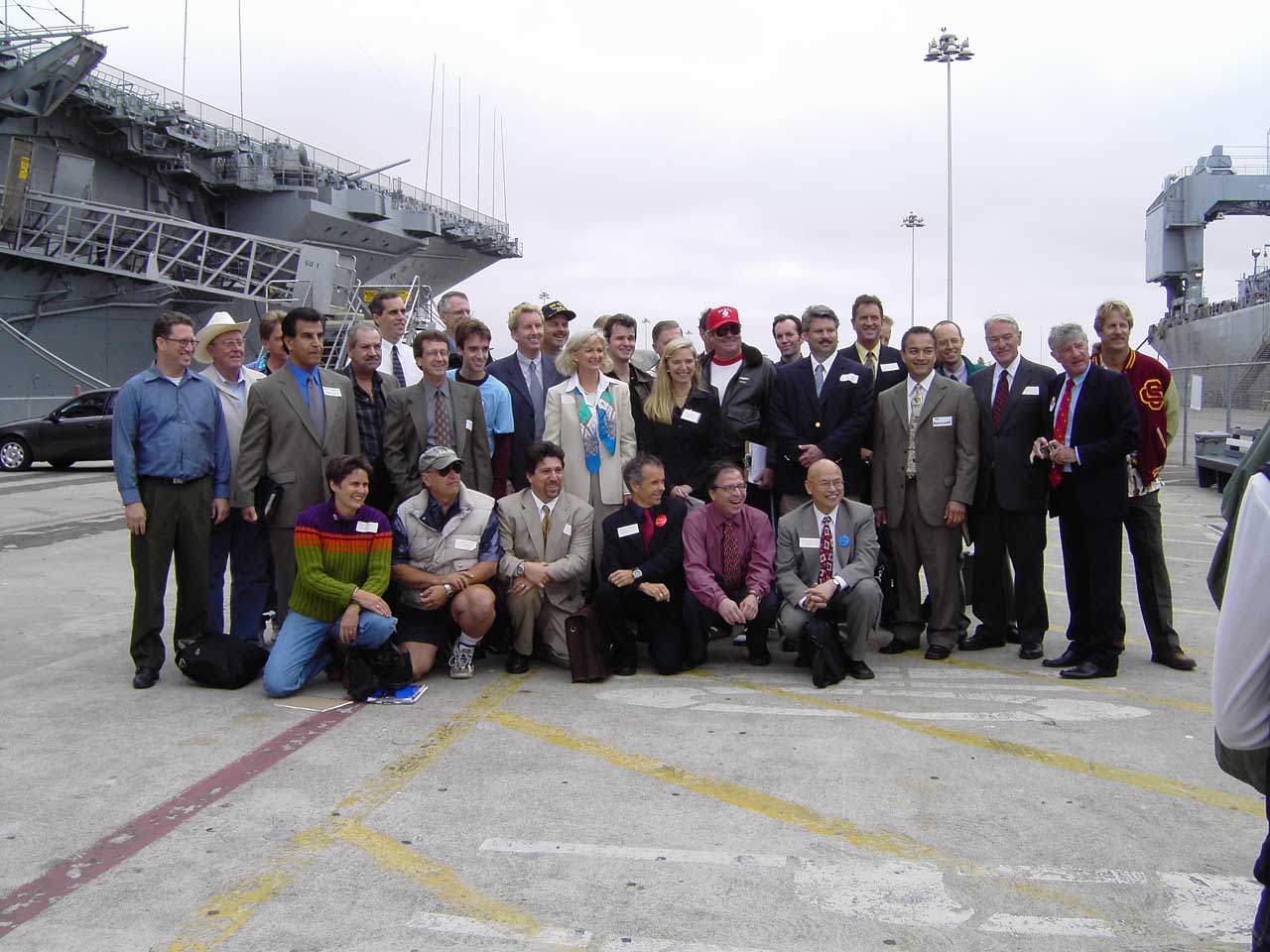Friday, January 13, 2006
Me So Sleepy...Me Want Movies and Dance Music
Pepper missed teaching aerobics last night because of his show (mentioned earlier), so instead we got pedal-to-the-medal Bonnie. My sluggish body and brain was unprepared. It was like "Ground Hog" day in a "Flashdance" video, but without the blow torches, the chair, and the refreshing water-dousing break. I'm not sure how I avoided shin splints. Maybe it's because I'm more a creature of the 70's than the 80's, and naked self-interest kept me "Stayin' Alive."
But speaking of dance music, isn't "Turn Up The Music" (Axwell), by Roger Sanchez, one fine dance tune?
Pepper missed teaching aerobics last night because of his show (mentioned earlier), so instead we got pedal-to-the-medal Bonnie. My sluggish body and brain was unprepared. It was like "Ground Hog" day in a "Flashdance" video, but without the blow torches, the chair, and the refreshing water-dousing break. I'm not sure how I avoided shin splints. Maybe it's because I'm more a creature of the 70's than the 80's, and naked self-interest kept me "Stayin' Alive."
But speaking of dance music, isn't "Turn Up The Music" (Axwell), by Roger Sanchez, one fine dance tune?
You gotta turn up the music!Like they say in "Eraserhead," 'it's new!'
Feel that sound
Think it's time you turned up the music
Feel that sound, washing me
Every time you turn up the music
San Juan-Chama Project at Albuquerque - What's Going On There?
Boy, there's sure a lot of commotion going on just downstream of the Alameda Bridge across the Rio Grande River. Massive construction associated with the San Juan-Chama Project is underway.
I found a lot of confusion in my own family about what's going on in their own hometown. I suspect this confusion mirrors confusion in the public at large. One of my sisters thought that San Juan water was being carried through pipes to this location, and injected directly into the aquifer there. The other sister suspected a plot (and I paraphrase):
The official description of the project sounds salubrious enough:
(pictures from December 30 and 31, 2005)
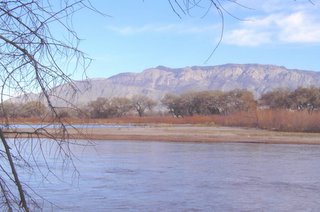 Things are still pretty bucolic in the bosque north of the Alameda Bridge over the Rio Grande River at Albuquerque. By the time I noisily crashed through the dense Russian Olive thickets lining the river, I had frightened off the ducks, and most of the seagulls (the white specks in the photos - it's strange that there are seagulls so far inland in the desert, but the desert river does many mysterious things to bird populations).
Things are still pretty bucolic in the bosque north of the Alameda Bridge over the Rio Grande River at Albuquerque. By the time I noisily crashed through the dense Russian Olive thickets lining the river, I had frightened off the ducks, and most of the seagulls (the white specks in the photos - it's strange that there are seagulls so far inland in the desert, but the desert river does many mysterious things to bird populations).
 Here is the view looking south from the Alameda Bridge. The San Juan-Chama project occupies about 15 acres in the riverbed and bosque, and comes close today to spanning the entire riverbed. I wanted very much to tour the work site, but it was a work day, and busy workers were everywhere, and so I made do by sneaking downstream through the bosque on the west bank of the river, in order to get a better look.
Here is the view looking south from the Alameda Bridge. The San Juan-Chama project occupies about 15 acres in the riverbed and bosque, and comes close today to spanning the entire riverbed. I wanted very much to tour the work site, but it was a work day, and busy workers were everywhere, and so I made do by sneaking downstream through the bosque on the west bank of the river, in order to get a better look.
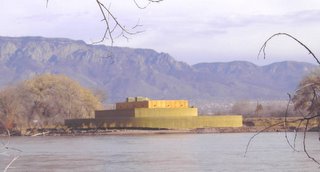 James Bond (and his dog) in the bushes. This mysterious kiva-shaped structure is apparently the municipal surface water treatment plant under construction. Or else, it's a unique, unsuspected, aquatic Anasazi ruin.
James Bond (and his dog) in the bushes. This mysterious kiva-shaped structure is apparently the municipal surface water treatment plant under construction. Or else, it's a unique, unsuspected, aquatic Anasazi ruin.
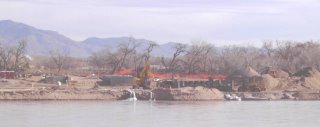 Another surreptitious look at the construction zone. Water was being withdrawn through pipes from the lateral canal on the east side of the river, and some of it was pouring back into the river from pipes, as seen in this photo. Of course, the water in the lateral canal had initially come from the river, and so the exact purpose of all this water shuffling was unclear: kind of like accounting for money. On the left side of the photo appear gray concrete forms that are probably meant for the bladder dam (or is it the coffer dam?) that is supposed to extend across the river.
Another surreptitious look at the construction zone. Water was being withdrawn through pipes from the lateral canal on the east side of the river, and some of it was pouring back into the river from pipes, as seen in this photo. Of course, the water in the lateral canal had initially come from the river, and so the exact purpose of all this water shuffling was unclear: kind of like accounting for money. On the left side of the photo appear gray concrete forms that are probably meant for the bladder dam (or is it the coffer dam?) that is supposed to extend across the river.
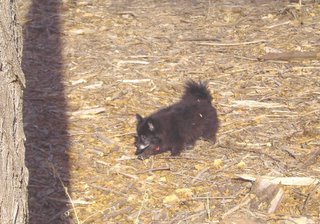 Hopelessly out of his element, Sparky, the city dog from California, doggedly trudges through the bosque in pursuit of his mad master, and tries hard to learn the thrills of being a rural dog.
Hopelessly out of his element, Sparky, the city dog from California, doggedly trudges through the bosque in pursuit of his mad master, and tries hard to learn the thrills of being a rural dog.
One interesting thing I noticed is that the four-winged saltbush plant appears to be more plentiful near the river than I ever recall it being before. It did not surprise me that high-desert, salt-loving plants were spreading into the fallow farm fields in the Rio Grande Valley (I had seen that advance when I once lived in Corrales), but their appearance right near the river, together with the generational decline and abrupt burnoff (e.g., the June, 2003 fires) of the old cottonwoods, suggests the region desertifies, if given half the chance by mankind. Is it a trend? Or maybe Mother Nature just wants to restore the area to what it was like before people were there? If it is a trend, in a century, the area will change character, and look a lot more like Socorro, and a lot less like Espanola: Rio Arriba will become Rio Abajo!
Today, the creosote bush that dominates the deserts of southern New Mexico makes it as far north as the hills west of Isleta Pueblo, only fifteen miles or so from this location. Cresote bush is a key plant species: how far north will it reach in a century? Will it make it to Albuquerque? What stops its northern advance - temperature, water, or competition?
Link
Boy, there's sure a lot of commotion going on just downstream of the Alameda Bridge across the Rio Grande River. Massive construction associated with the San Juan-Chama Project is underway.
I found a lot of confusion in my own family about what's going on in their own hometown. I suspect this confusion mirrors confusion in the public at large. One of my sisters thought that San Juan water was being carried through pipes to this location, and injected directly into the aquifer there. The other sister suspected a plot (and I paraphrase):
'(Albuquerque Mayor Martin) Chavez promised Intel (which has a large facility located in Rio Rancho) way too much of the city's aquifer water. They suddenly discovered the aquifer doesn't have nearly enough water for the city AND Intel, and now they are panicking.'Plots notwithstanding, some urgency might be in order. If I understand correctly, for years, the City of Albuquerque did not claim its full water rights to San Juan River water, even as water demand exploded elsewhere in the Colorado River Basin (of which the San Juan River is a part), particularly due to the cancerous growth of Las Vegas, withdrawals by the Central Arizona Project (CAP), and other escalating demands in the desert southwest. Use it now, or lose it forever - the Iron Law of the American West when it comes to water!
The official description of the project sounds salubrious enough:
The Albuquerque Bernalillo County Water Utility Authority’s San Juan-Chama Drinking Water Project will supply up to 70% of the metropolitan area’s future water. San Juan-Chama water diverted from the river will be transported to a state-of-the-art treatment plant, from which purified water will be delivered to Albuquerque area homes and businesses.Here is another link regarding the project.
(pictures from December 30 and 31, 2005)
 Things are still pretty bucolic in the bosque north of the Alameda Bridge over the Rio Grande River at Albuquerque. By the time I noisily crashed through the dense Russian Olive thickets lining the river, I had frightened off the ducks, and most of the seagulls (the white specks in the photos - it's strange that there are seagulls so far inland in the desert, but the desert river does many mysterious things to bird populations).
Things are still pretty bucolic in the bosque north of the Alameda Bridge over the Rio Grande River at Albuquerque. By the time I noisily crashed through the dense Russian Olive thickets lining the river, I had frightened off the ducks, and most of the seagulls (the white specks in the photos - it's strange that there are seagulls so far inland in the desert, but the desert river does many mysterious things to bird populations). Here is the view looking south from the Alameda Bridge. The San Juan-Chama project occupies about 15 acres in the riverbed and bosque, and comes close today to spanning the entire riverbed. I wanted very much to tour the work site, but it was a work day, and busy workers were everywhere, and so I made do by sneaking downstream through the bosque on the west bank of the river, in order to get a better look.
Here is the view looking south from the Alameda Bridge. The San Juan-Chama project occupies about 15 acres in the riverbed and bosque, and comes close today to spanning the entire riverbed. I wanted very much to tour the work site, but it was a work day, and busy workers were everywhere, and so I made do by sneaking downstream through the bosque on the west bank of the river, in order to get a better look. James Bond (and his dog) in the bushes. This mysterious kiva-shaped structure is apparently the municipal surface water treatment plant under construction. Or else, it's a unique, unsuspected, aquatic Anasazi ruin.
James Bond (and his dog) in the bushes. This mysterious kiva-shaped structure is apparently the municipal surface water treatment plant under construction. Or else, it's a unique, unsuspected, aquatic Anasazi ruin. Another surreptitious look at the construction zone. Water was being withdrawn through pipes from the lateral canal on the east side of the river, and some of it was pouring back into the river from pipes, as seen in this photo. Of course, the water in the lateral canal had initially come from the river, and so the exact purpose of all this water shuffling was unclear: kind of like accounting for money. On the left side of the photo appear gray concrete forms that are probably meant for the bladder dam (or is it the coffer dam?) that is supposed to extend across the river.
Another surreptitious look at the construction zone. Water was being withdrawn through pipes from the lateral canal on the east side of the river, and some of it was pouring back into the river from pipes, as seen in this photo. Of course, the water in the lateral canal had initially come from the river, and so the exact purpose of all this water shuffling was unclear: kind of like accounting for money. On the left side of the photo appear gray concrete forms that are probably meant for the bladder dam (or is it the coffer dam?) that is supposed to extend across the river. Hopelessly out of his element, Sparky, the city dog from California, doggedly trudges through the bosque in pursuit of his mad master, and tries hard to learn the thrills of being a rural dog.
Hopelessly out of his element, Sparky, the city dog from California, doggedly trudges through the bosque in pursuit of his mad master, and tries hard to learn the thrills of being a rural dog.One interesting thing I noticed is that the four-winged saltbush plant appears to be more plentiful near the river than I ever recall it being before. It did not surprise me that high-desert, salt-loving plants were spreading into the fallow farm fields in the Rio Grande Valley (I had seen that advance when I once lived in Corrales), but their appearance right near the river, together with the generational decline and abrupt burnoff (e.g., the June, 2003 fires) of the old cottonwoods, suggests the region desertifies, if given half the chance by mankind. Is it a trend? Or maybe Mother Nature just wants to restore the area to what it was like before people were there? If it is a trend, in a century, the area will change character, and look a lot more like Socorro, and a lot less like Espanola: Rio Arriba will become Rio Abajo!
Today, the creosote bush that dominates the deserts of southern New Mexico makes it as far north as the hills west of Isleta Pueblo, only fifteen miles or so from this location. Cresote bush is a key plant species: how far north will it reach in a century? Will it make it to Albuquerque? What stops its northern advance - temperature, water, or competition?
Link
"A Legacy Isn't A Legacy Until You Pass It On"
At the urging of Pepper Von, I went last night to see "And The Dream Goes On" at CSU, Sacramento, a revival-spirited celebration commemorating the work of Martin Luther King, Jr., but it's the first time I've seen the show (precisely how many previous incarnations there have been is unclear to me). I didn't understand the ticket reservation policy, so I just showed up, and someone just handed me a ticket, so it worked out well.
The show focused on generational clashes that result from pride, and a failure to listen, as much as anything else. The purpose of the musical show is to effectively pass on the core of the learned wisdom of the Civil Rights movement of the 50's and 60's, to a younger generation, without being overbearing or didactic.
I remember once seeing a film of a Civil Rights pioneer (name I've forgotten) as he walked the back roads of Mississippi in the early 60's. This fellow was alarmingly young; no more than twenty. His vision for the future of Mississippi was clear, simple, and quite radical, given the realities of the day: register everyone to vote. He was taking his life into his hands, he knew it, and yet he was unperturbed: he had a mission, and no earthly impediment would stop him. That zeal and clarity of purpose is hard to maintain throughout life, much less convey to a younger generation. The proper education of the young requires placing the message in a form easier to understand: a musical.
Bev Sykes at The Davis Enterprise summarized the show well:
Like they say, "A Legacy Isn't A Legacy Until You Pass It On!" The show continues through this weekend - check your newspaper!
[P.S.: I think that last Tarrer-Lacy quote in Bev's review is supposed to be "adversity", not "diversity."]
Link
At the urging of Pepper Von, I went last night to see "And The Dream Goes On" at CSU, Sacramento, a revival-spirited celebration commemorating the work of Martin Luther King, Jr., but it's the first time I've seen the show (precisely how many previous incarnations there have been is unclear to me). I didn't understand the ticket reservation policy, so I just showed up, and someone just handed me a ticket, so it worked out well.
The show focused on generational clashes that result from pride, and a failure to listen, as much as anything else. The purpose of the musical show is to effectively pass on the core of the learned wisdom of the Civil Rights movement of the 50's and 60's, to a younger generation, without being overbearing or didactic.
I remember once seeing a film of a Civil Rights pioneer (name I've forgotten) as he walked the back roads of Mississippi in the early 60's. This fellow was alarmingly young; no more than twenty. His vision for the future of Mississippi was clear, simple, and quite radical, given the realities of the day: register everyone to vote. He was taking his life into his hands, he knew it, and yet he was unperturbed: he had a mission, and no earthly impediment would stop him. That zeal and clarity of purpose is hard to maintain throughout life, much less convey to a younger generation. The proper education of the young requires placing the message in a form easier to understand: a musical.
Bev Sykes at The Davis Enterprise summarized the show well:
This year's production, "And the Dream Goes On," is the culmination of work that began with 2002's "Keeping the Dream Alive." The creative team — Anthony D'Juan and Lisa Tarrer-Lacy (book), and the Rev. Charles Cooper (music and lyrics) — found their efforts fueled by passion and a firm belief that they were obligated to pass on King's legacy, and that of the civil rights movement, to today's youth.Many fine performances, of course. Like Bev mentioned, Bill Miller and Elaine Lenae Douglas are excellent (as well as Pepper Von and his tap dance sequence). The dance trio is fine as well (I enjoyed comparing the dancers, and seeing, from second-to-second, who was doing best, because they often outdid each other). The three 'homies' are both skilled and lackadaisical in that youthful way that elders find so annoying. My favorite song was 'You Are' by Rachelle Archer, Shelanda Goss, and choir. I was also impressed with Kenna Wright's discipline: frozen while kneeling, out of the spotlight, for just the longest time, with a radiant smile, and not falling over, or having the smile turn into a Frankenstein mask.
...
"And the Dream Goes On" is at once a musical revue, a political statement and a good ol' revival meeting, with a heavy dose of history thrown in to hold it all together.
The central characters are a trio of men, each representing a different generation and perspective. The Dream Guide (Derrick A. Miller, reprising his spectacular performance from last year) is given the mission to share King's legacy with Chuck Temper (Stephen Lamar), an angry young man whose life centers around his "homies" (Robert Joseph Andrews and Thomas Wright).
Chuck feels the world owes him a living, and he's drifting through life without any real direction. Both Chuck and The Dream Guide battle internally as they try to discover and fulfill their intertwined destinies.
The Janitor (the incomparable Bill Miller) becomes the voice of wisdom who helps The Dream Guide and Chuck find a way to connect.
Outstanding moments take place in the "Museum of Living History," where heroes of the civil rights movement — sung and unsung — speak their piece. In the very moving finale to Act I, Kenna Wright — a vision of innocence in white, with large, luminous eyes, who clutches a teddy bear — sings "God Knows What's Best for Me," speculating on the possibilities ahead of her, minutes before she becomes a victim of the 1963 bombing of the 16th Street Baptist Church in Birmingham, Ala.
At the start of Act II, Elaine Lenae Douglas — accompanied by dancers Venetia James, Misty Kline and Sharen Moseby — portrays an elderly woman who participated in the bus boycott in Mississippi.
Albert (Noah Hayes) speaks out for interracial marriage, stating, "If you forbid me to love, then you forbid me to live."
Bill Miller and dancer Pepper Von give voice and vision to the pride of being an African American man, in the show-stopping "I Am a Man."
...
Tarrer-Lacy insists that this work is more than just a play: "I see it as a vehicle for reflection," she said, "a call to remember how far we have come, and a reminder that our work isn't complete. It is an acknowledgment that we are not the first to struggle against injustice, and that we can stand proud knowing that we, too, possess the strength to overcome diversity."
... Tickets are free, but they're available only at the University Theater Box Office 45 minutes before each show time. Two tickets per person may be picked up (only for that day's performance). Each ticket guarantees a seat until 15 minutes before show time, and seating is limited.
Like they say, "A Legacy Isn't A Legacy Until You Pass It On!" The show continues through this weekend - check your newspaper!
[P.S.: I think that last Tarrer-Lacy quote in Bev's review is supposed to be "adversity", not "diversity."]
Link
Thursday, January 12, 2006
Shrines To Dancers
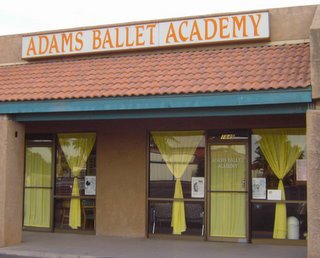 Here is Adams Ballet Academy, in Mesa, AZ. I took class with this school at its earlier location in Tempe (from 1988-89). Deborah and James still do take class with Mary Moe Adams.
Here is Adams Ballet Academy, in Mesa, AZ. I took class with this school at its earlier location in Tempe (from 1988-89). Deborah and James still do take class with Mary Moe Adams.
After a period of time, every good dance studio that prospers will erect informal shrines dedicated to the best of the dancers that receive training there. Newspaper clippings and beautiful photographs help inspire the young dancers that come into a studio to do their very best.
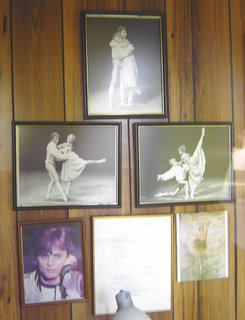 Peering through the windows of Adams' studio (they were still closed for holiday break when I passed through), photographs of Bonnie Moore grace the wall. Moore received her early training with Mary Moe Adams, and left to pursue ballet glory with the Washington Ballet, ABT, and the Royal Ballet.
Peering through the windows of Adams' studio (they were still closed for holiday break when I passed through), photographs of Bonnie Moore grace the wall. Moore received her early training with Mary Moe Adams, and left to pursue ballet glory with the Washington Ballet, ABT, and the Royal Ballet.
 Bonnie Moore as Juliet. Here is a link to other photographs (by James E. Strickland) of Bonnie Moore, and another link of a photo with her at ABT (Magnum photos).
Bonnie Moore as Juliet. Here is a link to other photographs (by James E. Strickland) of Bonnie Moore, and another link of a photo with her at ABT (Magnum photos).
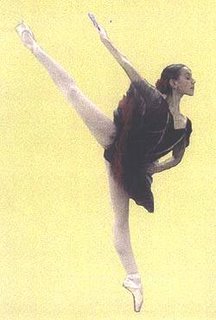 Other parts of the wall space were dedicated to another, more-recent standout, Presidential scholar Renee Noelle Meiffren (I touched up the JPEG trying to bring out details, but it looks instead like I made her dance in a lemon haze).
Other parts of the wall space were dedicated to another, more-recent standout, Presidential scholar Renee Noelle Meiffren (I touched up the JPEG trying to bring out details, but it looks instead like I made her dance in a lemon haze).
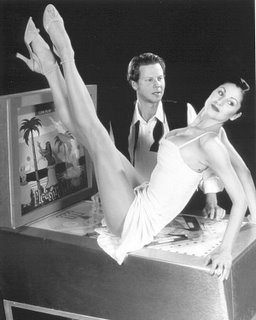 One very impressive dancer, who deserves a wall of her own, and who received Adams' training, is Holly Cruikshank. Holly's height posed a problem for a career in ballet, so she opted for Broadway. Holly played 'The Girl in the Yellow Dress' (among other roles) in the Broadway show "Contact," as well as roles in "Fosse" and "Movin' Out." She is one of the fabulous showgirls in the movie "The Producers," starring Nathan Lane and Matthew Broderick.
One very impressive dancer, who deserves a wall of her own, and who received Adams' training, is Holly Cruikshank. Holly's height posed a problem for a career in ballet, so she opted for Broadway. Holly played 'The Girl in the Yellow Dress' (among other roles) in the Broadway show "Contact," as well as roles in "Fosse" and "Movin' Out." She is one of the fabulous showgirls in the movie "The Producers," starring Nathan Lane and Matthew Broderick.
With students like these, Mary Moe Adams has so much to be proud of!
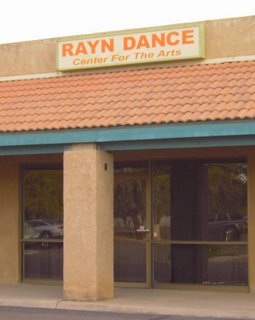 This is Rayn Dance, a modern dance studio, four doors down from the Adams Ballet Academy. They honor a different aesthetic over at Rayn Dance. As an example, there is a different emphasis on the role of breathing. They also dance barefoot and they have a different style of pirouettes compared to the ballet dancers. Nevertheless, if the school prospers, with time, they too will have an informal shrine to their own alumni. It's altogether fitting!
This is Rayn Dance, a modern dance studio, four doors down from the Adams Ballet Academy. They honor a different aesthetic over at Rayn Dance. As an example, there is a different emphasis on the role of breathing. They also dance barefoot and they have a different style of pirouettes compared to the ballet dancers. Nevertheless, if the school prospers, with time, they too will have an informal shrine to their own alumni. It's altogether fitting!
[Update: On April 10th, I took class at Mary's studio, and noticed that on the other side of the wall where Bonnie Moore's pictures are posted, where Mary has her tape player, that Holly Cruikshank has a little mini-shrine of her own!]
 Here is Adams Ballet Academy, in Mesa, AZ. I took class with this school at its earlier location in Tempe (from 1988-89). Deborah and James still do take class with Mary Moe Adams.
Here is Adams Ballet Academy, in Mesa, AZ. I took class with this school at its earlier location in Tempe (from 1988-89). Deborah and James still do take class with Mary Moe Adams.After a period of time, every good dance studio that prospers will erect informal shrines dedicated to the best of the dancers that receive training there. Newspaper clippings and beautiful photographs help inspire the young dancers that come into a studio to do their very best.
 Peering through the windows of Adams' studio (they were still closed for holiday break when I passed through), photographs of Bonnie Moore grace the wall. Moore received her early training with Mary Moe Adams, and left to pursue ballet glory with the Washington Ballet, ABT, and the Royal Ballet.
Peering through the windows of Adams' studio (they were still closed for holiday break when I passed through), photographs of Bonnie Moore grace the wall. Moore received her early training with Mary Moe Adams, and left to pursue ballet glory with the Washington Ballet, ABT, and the Royal Ballet. Bonnie Moore as Juliet. Here is a link to other photographs (by James E. Strickland) of Bonnie Moore, and another link of a photo with her at ABT (Magnum photos).
Bonnie Moore as Juliet. Here is a link to other photographs (by James E. Strickland) of Bonnie Moore, and another link of a photo with her at ABT (Magnum photos). Other parts of the wall space were dedicated to another, more-recent standout, Presidential scholar Renee Noelle Meiffren (I touched up the JPEG trying to bring out details, but it looks instead like I made her dance in a lemon haze).
Other parts of the wall space were dedicated to another, more-recent standout, Presidential scholar Renee Noelle Meiffren (I touched up the JPEG trying to bring out details, but it looks instead like I made her dance in a lemon haze). One very impressive dancer, who deserves a wall of her own, and who received Adams' training, is Holly Cruikshank. Holly's height posed a problem for a career in ballet, so she opted for Broadway. Holly played 'The Girl in the Yellow Dress' (among other roles) in the Broadway show "Contact," as well as roles in "Fosse" and "Movin' Out." She is one of the fabulous showgirls in the movie "The Producers," starring Nathan Lane and Matthew Broderick.
One very impressive dancer, who deserves a wall of her own, and who received Adams' training, is Holly Cruikshank. Holly's height posed a problem for a career in ballet, so she opted for Broadway. Holly played 'The Girl in the Yellow Dress' (among other roles) in the Broadway show "Contact," as well as roles in "Fosse" and "Movin' Out." She is one of the fabulous showgirls in the movie "The Producers," starring Nathan Lane and Matthew Broderick.With students like these, Mary Moe Adams has so much to be proud of!
 This is Rayn Dance, a modern dance studio, four doors down from the Adams Ballet Academy. They honor a different aesthetic over at Rayn Dance. As an example, there is a different emphasis on the role of breathing. They also dance barefoot and they have a different style of pirouettes compared to the ballet dancers. Nevertheless, if the school prospers, with time, they too will have an informal shrine to their own alumni. It's altogether fitting!
This is Rayn Dance, a modern dance studio, four doors down from the Adams Ballet Academy. They honor a different aesthetic over at Rayn Dance. As an example, there is a different emphasis on the role of breathing. They also dance barefoot and they have a different style of pirouettes compared to the ballet dancers. Nevertheless, if the school prospers, with time, they too will have an informal shrine to their own alumni. It's altogether fitting![Update: On April 10th, I took class at Mary's studio, and noticed that on the other side of the wall where Bonnie Moore's pictures are posted, where Mary has her tape player, that Holly Cruikshank has a little mini-shrine of her own!]
Wednesday, January 11, 2006
 VLA
VLAWow! What a place! In the empty, silent Plains of San Augustin of western NM - Voila! The VLA (Very Large Array) radiotelescope dishes, arrayed on rails across the grassland like a peace symbol (on three sets of rails, each set 120 degrees apart from one another, kind of like a bird footprint). The VLA is an important part of the global VLBA (Very Large Baseline Array). The waveguide electronics are being upgraded to fiber optics, for even faster data transmission. A portion of the movie "Contact," starring Jodie Foster, was filmed here.
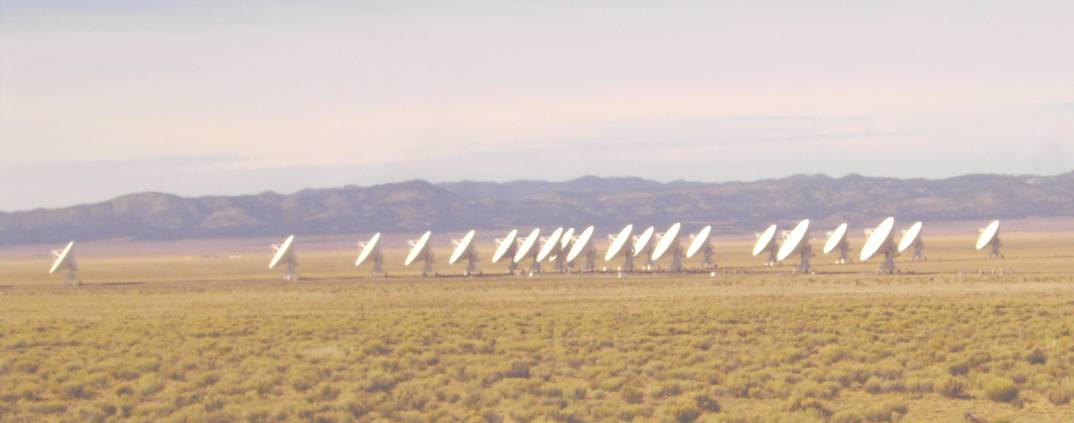
The antennas swung from the SW sky to the eastern sky over the space of an hour or so.
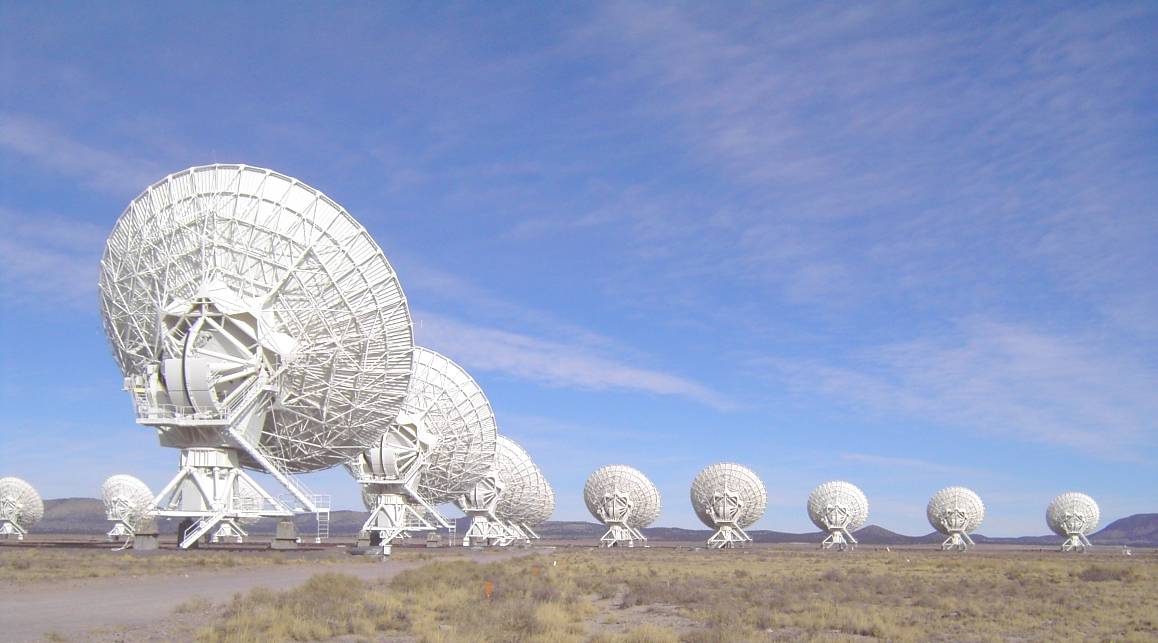
We can hear you, but we can't understand you!
New Mexico Tech
It's been way more than a month of Sundays since I walked around the NM Tech campus in Socorro (I went there freshman and sophomore years, in 1974-75). Lots of changes in the intervening thirty years!
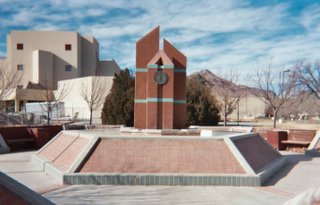 New Name-a-Brick monument in the central space on campus. Most of the names on the bricks were unfamiliar, but EJ Workman rang a bell.
New Name-a-Brick monument in the central space on campus. Most of the names on the bricks were unfamiliar, but EJ Workman rang a bell.
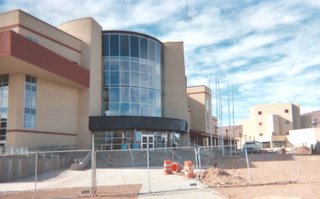 Ye Gods - the new Student Center! Workman Center is in the background.
Ye Gods - the new Student Center! Workman Center is in the background.
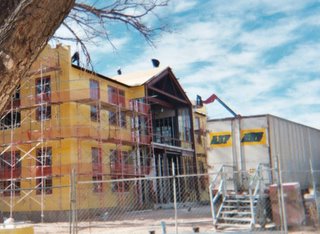 Subdued construction workers on the roof gaze down at the ground, just seconds after they lost control of a hard hat, which came crashing down and clattered on the ground. This building is in-between Cramer and Weir Halls.
Subdued construction workers on the roof gaze down at the ground, just seconds after they lost control of a hard hat, which came crashing down and clattered on the ground. This building is in-between Cramer and Weir Halls.
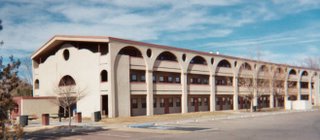 Student residence South Hall used to look like a Motel 6 back in the day. Today, it looks like a La Quinta Motor Inn.
Student residence South Hall used to look like a Motel 6 back in the day. Today, it looks like a La Quinta Motor Inn.
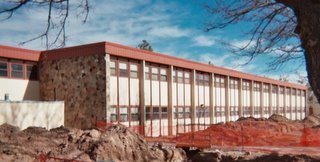 In contrast to South Hall, despite ongoing construction, and some faux southwestern-style roofing material, student residence West Hall looks reassuringly familiar.
In contrast to South Hall, despite ongoing construction, and some faux southwestern-style roofing material, student residence West Hall looks reassuringly familiar.
It's been way more than a month of Sundays since I walked around the NM Tech campus in Socorro (I went there freshman and sophomore years, in 1974-75). Lots of changes in the intervening thirty years!
 New Name-a-Brick monument in the central space on campus. Most of the names on the bricks were unfamiliar, but EJ Workman rang a bell.
New Name-a-Brick monument in the central space on campus. Most of the names on the bricks were unfamiliar, but EJ Workman rang a bell. Ye Gods - the new Student Center! Workman Center is in the background.
Ye Gods - the new Student Center! Workman Center is in the background. Subdued construction workers on the roof gaze down at the ground, just seconds after they lost control of a hard hat, which came crashing down and clattered on the ground. This building is in-between Cramer and Weir Halls.
Subdued construction workers on the roof gaze down at the ground, just seconds after they lost control of a hard hat, which came crashing down and clattered on the ground. This building is in-between Cramer and Weir Halls. Student residence South Hall used to look like a Motel 6 back in the day. Today, it looks like a La Quinta Motor Inn.
Student residence South Hall used to look like a Motel 6 back in the day. Today, it looks like a La Quinta Motor Inn. In contrast to South Hall, despite ongoing construction, and some faux southwestern-style roofing material, student residence West Hall looks reassuringly familiar.
In contrast to South Hall, despite ongoing construction, and some faux southwestern-style roofing material, student residence West Hall looks reassuringly familiar.
A Tricky Interface: Professional vs. Amateur Theater
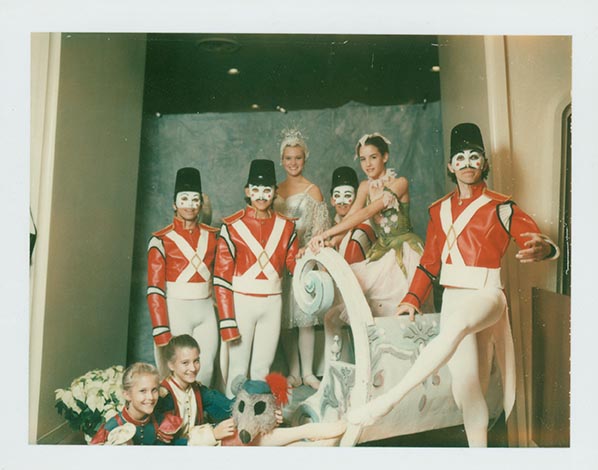
Deborah McMillion-Nering sent this wonderful picture from back in the day.
It's around Halloween, 1988, and we are at Sak's 5th Avenue (I believe at the Biltmore Fashion Park, in NE Phoenix, AZ.) Ballet Arizona, under the direction of Jean Paul Comelin, is doing a promotional event for Ballet Arizona's upcoming "Nutcracker." I am at far left, and James Bucanek is at far right. Adjacent to the mouse is Andrea Blankstein: Jennifer Lofgren is regal in her snow costume, and Molly (?) is decked out in flowers.
 Unlike many ballet choreographers, and to his great credit, Jean Paul Comelin encouraged interaction between amateur and professional dancers. That interaction is of great educational value for up-and-coming dancers, and as a side benefit, allowed Jean Paul to fill his stage with numerous people in a lavish spectacle.
Unlike many ballet choreographers, and to his great credit, Jean Paul Comelin encouraged interaction between amateur and professional dancers. That interaction is of great educational value for up-and-coming dancers, and as a side benefit, allowed Jean Paul to fill his stage with numerous people in a lavish spectacle.
Nevertheless, it's a tricky place, that twilight netherworld between the amateur and professional spheres. For me, the interaction was disastrous. In first rehearsal of the Soldier/Mice battle, Jean Paul ordered the soldiers to rapidly hustle on-stage from the wings, crawling quickly on elbows and knees. I attacked the stage so hard with my flesh that the skin on my elbows and knees ripped into shreds, covering the stage in blood. To my great regret, since there was no time to heal, I had to leave the production immediately.

Andrea Blankstein has gone on to greater things, however.

Deborah McMillion-Nering sent this wonderful picture from back in the day.
It's around Halloween, 1988, and we are at Sak's 5th Avenue (I believe at the Biltmore Fashion Park, in NE Phoenix, AZ.) Ballet Arizona, under the direction of Jean Paul Comelin, is doing a promotional event for Ballet Arizona's upcoming "Nutcracker." I am at far left, and James Bucanek is at far right. Adjacent to the mouse is Andrea Blankstein: Jennifer Lofgren is regal in her snow costume, and Molly (?) is decked out in flowers.
 Unlike many ballet choreographers, and to his great credit, Jean Paul Comelin encouraged interaction between amateur and professional dancers. That interaction is of great educational value for up-and-coming dancers, and as a side benefit, allowed Jean Paul to fill his stage with numerous people in a lavish spectacle.
Unlike many ballet choreographers, and to his great credit, Jean Paul Comelin encouraged interaction between amateur and professional dancers. That interaction is of great educational value for up-and-coming dancers, and as a side benefit, allowed Jean Paul to fill his stage with numerous people in a lavish spectacle.Nevertheless, it's a tricky place, that twilight netherworld between the amateur and professional spheres. For me, the interaction was disastrous. In first rehearsal of the Soldier/Mice battle, Jean Paul ordered the soldiers to rapidly hustle on-stage from the wings, crawling quickly on elbows and knees. I attacked the stage so hard with my flesh that the skin on my elbows and knees ripped into shreds, covering the stage in blood. To my great regret, since there was no time to heal, I had to leave the production immediately.

Andrea Blankstein has gone on to greater things, however.
ANDREA BLANKSTEIN (Dancer) was born in Boras, Sweden. Ms. Blankstein began her ballet training with Mary Moe Adams at Adams Ballet Academy in Tempe, Arizona. At the age of sixteen Ms. Blankstein was awarded the Bartholin Prize at the Bartholin International Ballet Seminar in Copenhagen, Denmark. Upon the invitation of Peter Schaufuss she joined the Deutsche Oper Berlin in Germany where she danced a wide range of ballets and roles including a pas de trois created for her by Bill T. Jones and Candide in Sleeping Beauty by Peter Schaufuss. Ms. Blankstein joined the Cleveland San Jose Ballet upon her return to the United States, later joining Ballet Arizona, and has recently performed as a guest artist with the Milwaukee Ballet Company. Ms. Blankstein regularly teaches at Adams Ballet Academy and the Jordan Center for the Arts.And James Bucanek still inhabits the twilight netherworld, teaching at times at Mary Moe Adam's Ballet Academy in Mesa, AZ, but given the less-welcoming attitude of management at Ballet Arizona (under the direction of Ib Anderson) towards amateur dancers, James is no longer involved with Ballet Arizona productions. But there are always creative outlets, no matter what: James just authored a computer textbook entitled "Beginning Xcode", which will be available soon at Amazon.com, among other places.
Monday, January 09, 2006
Fate
I always thought I'd die by being struck by a bus while absent-mindedly crossing the street, but this fate seems far more likely:
Link
I always thought I'd die by being struck by a bus while absent-mindedly crossing the street, but this fate seems far more likely:
Rose's husband believes she fell while looking for the phone in the house this week and suffocated. There were so many piles of items that the man did not realize she was dead in the home.
Shelton Police Chief Terry Davenport said the home was so cluttered that police officers' heads touched the ceiling as they climbed over the clutter.
And the home was so cluttered that police didn't see the woman until their second search of the home.
Link
Wow!
Murdoch bought Myspace, and now they are censoring what people write on it! That is SO Fox News! What a terrible, terrible shame! I envied what they had done there. Now people have got to decide for themselves whether to stay or leave.
Link
Murdoch bought Myspace, and now they are censoring what people write on it! That is SO Fox News! What a terrible, terrible shame! I envied what they had done there. Now people have got to decide for themselves whether to stay or leave.
Link
Sunday, January 08, 2006
Vistas Lindas
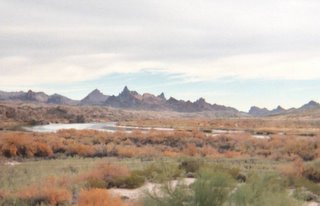 I had always thought that Needles, CA, was named after cactus needles, but apparently not: instead, it's these namesake peaks, located across the Colorado River in AZ, as seen here from Topock, AZ, that make for a pretty volcanic vista.
I had always thought that Needles, CA, was named after cactus needles, but apparently not: instead, it's these namesake peaks, located across the Colorado River in AZ, as seen here from Topock, AZ, that make for a pretty volcanic vista.
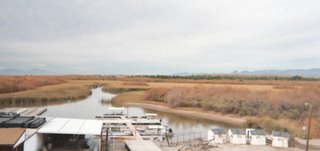 Here is another vista that greeted Oklahoma Dust Bowl refugees heading for California: the Colorado River Valley, as seen from the Topock marina. Cattail marshes like this are so rare in the desert SW as to be almost non-existent. Invasive, alien salt cedar is intruding into the marsh, and crowding out the welcome cattails. Salt cedar control is important along southwestern waterways - it's not impossible, but it does requires a lot of dedication and hard work.
Here is another vista that greeted Oklahoma Dust Bowl refugees heading for California: the Colorado River Valley, as seen from the Topock marina. Cattail marshes like this are so rare in the desert SW as to be almost non-existent. Invasive, alien salt cedar is intruding into the marsh, and crowding out the welcome cattails. Salt cedar control is important along southwestern waterways - it's not impossible, but it does requires a lot of dedication and hard work.
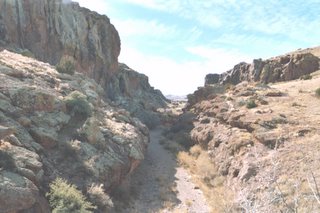 Box Canyon, as seen from Highway 60, a few miles SW of Socorro, NM.
Box Canyon, as seen from Highway 60, a few miles SW of Socorro, NM.
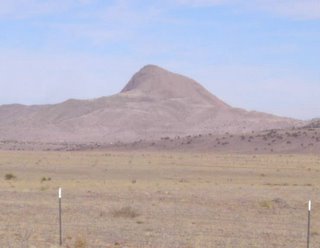 Strawberry Peak, as seen from Highway 60.
Strawberry Peak, as seen from Highway 60.
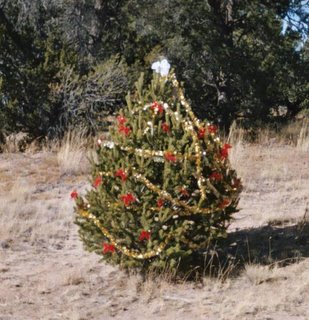 Random roadside holiday whimsy (between Magdalena NM, and the VLA).
Random roadside holiday whimsy (between Magdalena NM, and the VLA).
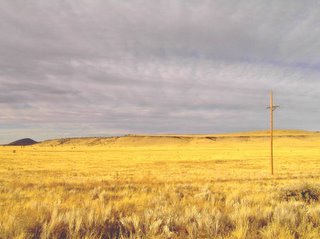 Beautiful sky and mesa, just east of Red Hill, NM.
Beautiful sky and mesa, just east of Red Hill, NM.
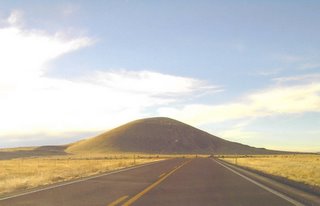 Volcanic cone of precise mathematical shape, along Highway 60, heading towards Show Low from Springerville, AZ.
Volcanic cone of precise mathematical shape, along Highway 60, heading towards Show Low from Springerville, AZ.
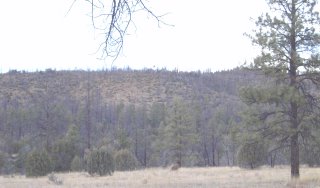 Eyeing mountain ridges on the other side of Corduroy Creek, near Carrizo, AZ, on the Fort Apache Indian Reservation, just a few miles SW of Show Low. I was surprised how little fire damage was evident: this entire area went up in flames just a few years ago. Apparently they succeeded in saving areas near the highway, though. Nevertheless, all the trees you see on the distant ridges are nothing but matchsticks - the fire burnt them all!
Eyeing mountain ridges on the other side of Corduroy Creek, near Carrizo, AZ, on the Fort Apache Indian Reservation, just a few miles SW of Show Low. I was surprised how little fire damage was evident: this entire area went up in flames just a few years ago. Apparently they succeeded in saving areas near the highway, though. Nevertheless, all the trees you see on the distant ridges are nothing but matchsticks - the fire burnt them all!
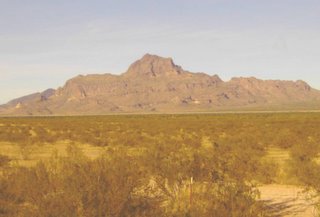 The Little Harquahala Mountains, Yuma County, AZ.
The Little Harquahala Mountains, Yuma County, AZ.
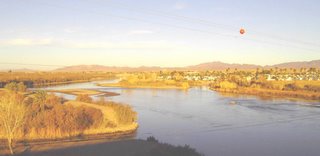 The Colorado River at the I-10 bridge, near Blythe, CA.
The Colorado River at the I-10 bridge, near Blythe, CA.
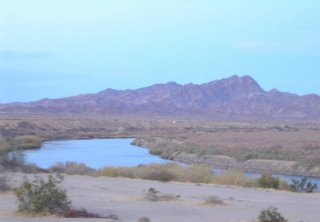 Dusk, looking north along the lower Colorado River Valley. Those may be the Whipple Mountains in the distance.
Dusk, looking north along the lower Colorado River Valley. Those may be the Whipple Mountains in the distance.
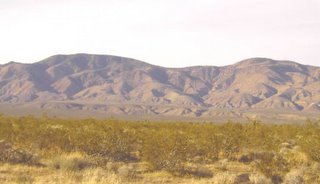 Mojave Desert side of the Tehachapi Mountains. The alluvial fan at the base of the mountains is truly remarkable. The alluvial fan appears to be hanging: it was abruptly elevated, and essentially severed, from the desert below. The Tehachapis are some of the most seismically-active mountains in the U.S., but this amount of fairly-recent mountain growth is truly astonishing!
Mojave Desert side of the Tehachapi Mountains. The alluvial fan at the base of the mountains is truly remarkable. The alluvial fan appears to be hanging: it was abruptly elevated, and essentially severed, from the desert below. The Tehachapis are some of the most seismically-active mountains in the U.S., but this amount of fairly-recent mountain growth is truly astonishing!
 I had always thought that Needles, CA, was named after cactus needles, but apparently not: instead, it's these namesake peaks, located across the Colorado River in AZ, as seen here from Topock, AZ, that make for a pretty volcanic vista.
I had always thought that Needles, CA, was named after cactus needles, but apparently not: instead, it's these namesake peaks, located across the Colorado River in AZ, as seen here from Topock, AZ, that make for a pretty volcanic vista. Here is another vista that greeted Oklahoma Dust Bowl refugees heading for California: the Colorado River Valley, as seen from the Topock marina. Cattail marshes like this are so rare in the desert SW as to be almost non-existent. Invasive, alien salt cedar is intruding into the marsh, and crowding out the welcome cattails. Salt cedar control is important along southwestern waterways - it's not impossible, but it does requires a lot of dedication and hard work.
Here is another vista that greeted Oklahoma Dust Bowl refugees heading for California: the Colorado River Valley, as seen from the Topock marina. Cattail marshes like this are so rare in the desert SW as to be almost non-existent. Invasive, alien salt cedar is intruding into the marsh, and crowding out the welcome cattails. Salt cedar control is important along southwestern waterways - it's not impossible, but it does requires a lot of dedication and hard work. Box Canyon, as seen from Highway 60, a few miles SW of Socorro, NM.
Box Canyon, as seen from Highway 60, a few miles SW of Socorro, NM. Strawberry Peak, as seen from Highway 60.
Strawberry Peak, as seen from Highway 60. Random roadside holiday whimsy (between Magdalena NM, and the VLA).
Random roadside holiday whimsy (between Magdalena NM, and the VLA). Beautiful sky and mesa, just east of Red Hill, NM.
Beautiful sky and mesa, just east of Red Hill, NM. Volcanic cone of precise mathematical shape, along Highway 60, heading towards Show Low from Springerville, AZ.
Volcanic cone of precise mathematical shape, along Highway 60, heading towards Show Low from Springerville, AZ. Eyeing mountain ridges on the other side of Corduroy Creek, near Carrizo, AZ, on the Fort Apache Indian Reservation, just a few miles SW of Show Low. I was surprised how little fire damage was evident: this entire area went up in flames just a few years ago. Apparently they succeeded in saving areas near the highway, though. Nevertheless, all the trees you see on the distant ridges are nothing but matchsticks - the fire burnt them all!
Eyeing mountain ridges on the other side of Corduroy Creek, near Carrizo, AZ, on the Fort Apache Indian Reservation, just a few miles SW of Show Low. I was surprised how little fire damage was evident: this entire area went up in flames just a few years ago. Apparently they succeeded in saving areas near the highway, though. Nevertheless, all the trees you see on the distant ridges are nothing but matchsticks - the fire burnt them all! The Little Harquahala Mountains, Yuma County, AZ.
The Little Harquahala Mountains, Yuma County, AZ. The Colorado River at the I-10 bridge, near Blythe, CA.
The Colorado River at the I-10 bridge, near Blythe, CA. Dusk, looking north along the lower Colorado River Valley. Those may be the Whipple Mountains in the distance.
Dusk, looking north along the lower Colorado River Valley. Those may be the Whipple Mountains in the distance. Mojave Desert side of the Tehachapi Mountains. The alluvial fan at the base of the mountains is truly remarkable. The alluvial fan appears to be hanging: it was abruptly elevated, and essentially severed, from the desert below. The Tehachapis are some of the most seismically-active mountains in the U.S., but this amount of fairly-recent mountain growth is truly astonishing!
Mojave Desert side of the Tehachapi Mountains. The alluvial fan at the base of the mountains is truly remarkable. The alluvial fan appears to be hanging: it was abruptly elevated, and essentially severed, from the desert below. The Tehachapis are some of the most seismically-active mountains in the U.S., but this amount of fairly-recent mountain growth is truly astonishing!
Woodside Condo Flooding
From September, 1990 through March, 1993, I lived across the street from the Woodside condominium complex in Sacramento, the one that flooded so badly recently when Strong Ranch Slough backed up. It worked out for me at the time because that was a dry period of time (with flooding in 1986 and 1997, and now in 2006). Dodged a bullet there: I'm sorry others weren't so lucky!
Link
From September, 1990 through March, 1993, I lived across the street from the Woodside condominium complex in Sacramento, the one that flooded so badly recently when Strong Ranch Slough backed up. It worked out for me at the time because that was a dry period of time (with flooding in 1986 and 1997, and now in 2006). Dodged a bullet there: I'm sorry others weren't so lucky!
Link
Mouse That Roared - Revised
Surprise New Mexico pest revenge:
Link
Surprise New Mexico pest revenge:
"I had some leaves burning outside, so I threw it in the fire, and the mouse was on fire and ran back at the house," Mares said from a motel room Saturday.Well, that was the original tale! Today, it appears to have been a joke. ONM!
The mouse story, however, has been doused by Mares.
"It's really humorous more than anything that a mouse burned down the house," he told KOAT-TV in Albuquerque. The mouse was dead when it hit the burning leaves.
Mares said he trapped and killed the critter and tossed it on the fire.
The flames, he said, probably reached his house because they were driven by high winds.
Capt. Jim Lyssy of the Fort Sumner Fire Department said the rumor probably got started because there was "a little too much excitement" at the time of the fire.
Mares lost everything -- and has no insurance -- but the mouse story still makes him smile.
"I started laughing, and I'll be laughing from now on," he said. "It's silly."
Link
Arizona State Memories
A bad year in general (1988-1989), but the campus is still quite an interesting place.
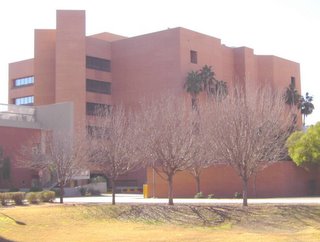 Bateman Physical Sciences Center, Arizona State University, Tempe, AZ, January 4, 2006.
Bateman Physical Sciences Center, Arizona State University, Tempe, AZ, January 4, 2006.
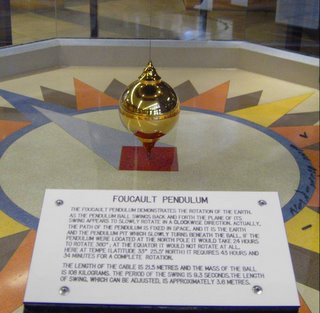 They have some nice science displays at the Bateman Center, including petrified wood, a seismograph, and the showcase Foucault Pendulum.
They have some nice science displays at the Bateman Center, including petrified wood, a seismograph, and the showcase Foucault Pendulum.
A bad year in general (1988-1989), but the campus is still quite an interesting place.
 Bateman Physical Sciences Center, Arizona State University, Tempe, AZ, January 4, 2006.
Bateman Physical Sciences Center, Arizona State University, Tempe, AZ, January 4, 2006. They have some nice science displays at the Bateman Center, including petrified wood, a seismograph, and the showcase Foucault Pendulum.
They have some nice science displays at the Bateman Center, including petrified wood, a seismograph, and the showcase Foucault Pendulum.
Curriculum Vitae
A quick review of my education:
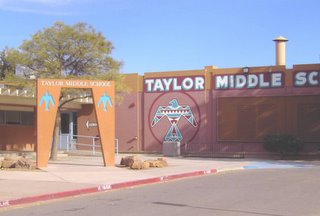 Taylor Middle School is a lot more colorful today than back in the day! Where did Laguna Elementary School go, though? The two schools used to share the campus....
Taylor Middle School is a lot more colorful today than back in the day! Where did Laguna Elementary School go, though? The two schools used to share the campus....
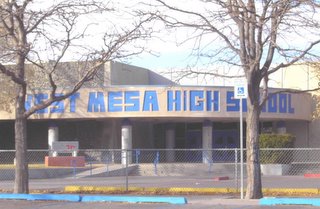 West Mesa High School, home of the Mustangs, looks different today too! They have an aquatic center just to the west now. The portable buildings look just the same, though!
West Mesa High School, home of the Mustangs, looks different today too! They have an aquatic center just to the west now. The portable buildings look just the same, though!
A quick review of my education:
 Taylor Middle School is a lot more colorful today than back in the day! Where did Laguna Elementary School go, though? The two schools used to share the campus....
Taylor Middle School is a lot more colorful today than back in the day! Where did Laguna Elementary School go, though? The two schools used to share the campus.... West Mesa High School, home of the Mustangs, looks different today too! They have an aquatic center just to the west now. The portable buildings look just the same, though!
West Mesa High School, home of the Mustangs, looks different today too! They have an aquatic center just to the west now. The portable buildings look just the same, though!
Southwestern Churches
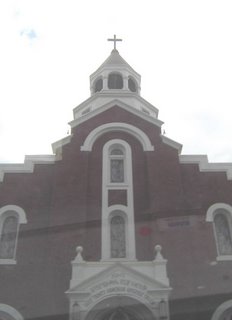 Holy Trinity Armenian Apostolic Church, in Fresno. I tried to be discreet with this photo: a funeral was just getting out when I drove past on December 27th, so I shot straight up.
Holy Trinity Armenian Apostolic Church, in Fresno. I tried to be discreet with this photo: a funeral was just getting out when I drove past on December 27th, so I shot straight up.
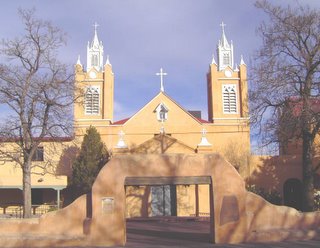 San Felipe de Neri Catholic Church, on Old Town Plaza, Albuquerque, NM, January 2, 2006.
San Felipe de Neri Catholic Church, on Old Town Plaza, Albuquerque, NM, January 2, 2006.
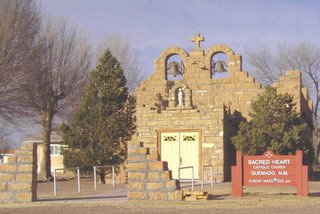 Sacred Heart Catholic Church, Quemado, New Mexico, January 2, 2006.
Sacred Heart Catholic Church, Quemado, New Mexico, January 2, 2006.
 Holy Trinity Armenian Apostolic Church, in Fresno. I tried to be discreet with this photo: a funeral was just getting out when I drove past on December 27th, so I shot straight up.
Holy Trinity Armenian Apostolic Church, in Fresno. I tried to be discreet with this photo: a funeral was just getting out when I drove past on December 27th, so I shot straight up. San Felipe de Neri Catholic Church, on Old Town Plaza, Albuquerque, NM, January 2, 2006.
San Felipe de Neri Catholic Church, on Old Town Plaza, Albuquerque, NM, January 2, 2006. Sacred Heart Catholic Church, Quemado, New Mexico, January 2, 2006.
Sacred Heart Catholic Church, Quemado, New Mexico, January 2, 2006.
Albuquerque New Year's Eve
There have been some notable Albuquerque New Year's Eves. There was December 31, 1994, the 'Night of Sex and Death' (visited the 'Ice House' strip club, followed by Sparky and I being first at the scene of a fatal traffic accident). Then there was Y2K, when Albuquerque went all out, with fireworks, live musical acts, and throngs of partying people in the streets and the clubs.
This year, in comparison, was quite restrained. The law was everywhere!
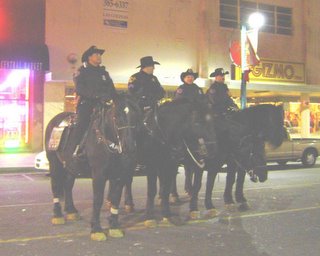 Don't even think about mischief!
Don't even think about mischief!
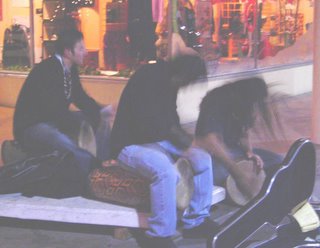 These guys had the right idea.
These guys had the right idea.
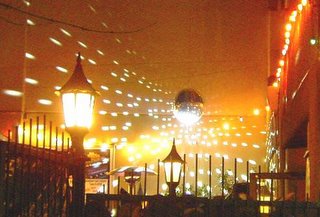 'The Distillery' featured a fabulous disco ball in their outdoor courtyard, which descended very, very slowly, a few minutes after midnight.
'The Distillery' featured a fabulous disco ball in their outdoor courtyard, which descended very, very slowly, a few minutes after midnight.
There have been some notable Albuquerque New Year's Eves. There was December 31, 1994, the 'Night of Sex and Death' (visited the 'Ice House' strip club, followed by Sparky and I being first at the scene of a fatal traffic accident). Then there was Y2K, when Albuquerque went all out, with fireworks, live musical acts, and throngs of partying people in the streets and the clubs.
This year, in comparison, was quite restrained. The law was everywhere!
 Don't even think about mischief!
Don't even think about mischief! These guys had the right idea.
These guys had the right idea. 'The Distillery' featured a fabulous disco ball in their outdoor courtyard, which descended very, very slowly, a few minutes after midnight.
'The Distillery' featured a fabulous disco ball in their outdoor courtyard, which descended very, very slowly, a few minutes after midnight.
Southwestern Technology
Cool technologies on display during the trip....
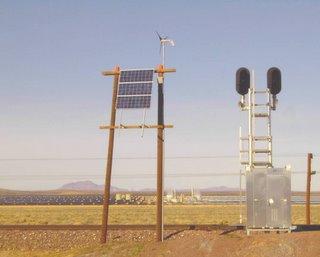 A solar-powered anemometer (and railway signal?) In the background is FPL Energy's solar-powered power plant, just NE of Kramer Junction, CA (where Highways 395 and 58 intersect, between Barstow and Bakersfield).
A solar-powered anemometer (and railway signal?) In the background is FPL Energy's solar-powered power plant, just NE of Kramer Junction, CA (where Highways 395 and 58 intersect, between Barstow and Bakersfield).
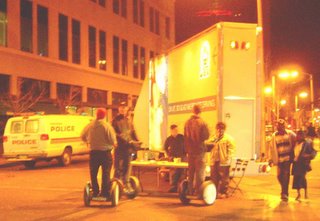 Albuquerque police used both horses and Segways to patrol fairly-subdued New Year's Eve partiers in the downtown area (you'd be subdued too, with both old and new technologies in play).
Albuquerque police used both horses and Segways to patrol fairly-subdued New Year's Eve partiers in the downtown area (you'd be subdued too, with both old and new technologies in play).
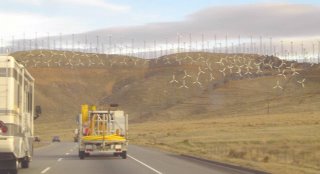 Wind power generation in the Tehachapi Mountains, above Highway 58, between Bakersfield and Mojave, CA.
Wind power generation in the Tehachapi Mountains, above Highway 58, between Bakersfield and Mojave, CA.
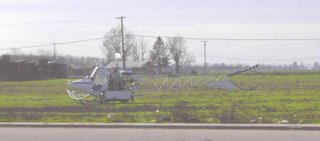 This is the funkiest-wunkiest helicopter I've ever seen (just NE of Tulare, CA). I mean, it looks like it's powered by a lawnmower engine!
This is the funkiest-wunkiest helicopter I've ever seen (just NE of Tulare, CA). I mean, it looks like it's powered by a lawnmower engine!
Cool technologies on display during the trip....
 A solar-powered anemometer (and railway signal?) In the background is FPL Energy's solar-powered power plant, just NE of Kramer Junction, CA (where Highways 395 and 58 intersect, between Barstow and Bakersfield).
A solar-powered anemometer (and railway signal?) In the background is FPL Energy's solar-powered power plant, just NE of Kramer Junction, CA (where Highways 395 and 58 intersect, between Barstow and Bakersfield). Albuquerque police used both horses and Segways to patrol fairly-subdued New Year's Eve partiers in the downtown area (you'd be subdued too, with both old and new technologies in play).
Albuquerque police used both horses and Segways to patrol fairly-subdued New Year's Eve partiers in the downtown area (you'd be subdued too, with both old and new technologies in play). Wind power generation in the Tehachapi Mountains, above Highway 58, between Bakersfield and Mojave, CA.
Wind power generation in the Tehachapi Mountains, above Highway 58, between Bakersfield and Mojave, CA. This is the funkiest-wunkiest helicopter I've ever seen (just NE of Tulare, CA). I mean, it looks like it's powered by a lawnmower engine!
This is the funkiest-wunkiest helicopter I've ever seen (just NE of Tulare, CA). I mean, it looks like it's powered by a lawnmower engine!
Video Games
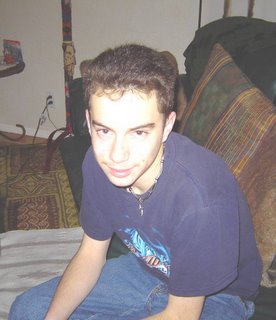 This is my nephew Aaron. He has a Playstation II. He plays video games. He plays LOTS of video games!
This is my nephew Aaron. He has a Playstation II. He plays video games. He plays LOTS of video games!
Aaron uses his gaming skills to drive his hapless elders into mortifying defeats. It wasn't so much being repeatedly shot in the back of the head, while I tried to figure out how to stop gazing at ceiling lights and whirling in circles, that bothered me so much: it was the acute embarrassment.
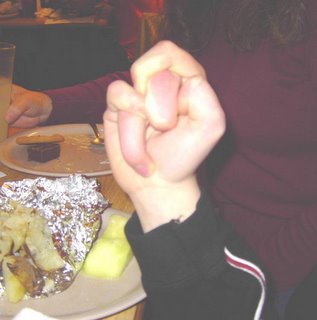 Here is my nephew's hand. He can fold his thumb sideways and backwards, so it points up the arm. It's not genetic, or else I'd be able to do the same. I blame the video game controller. See, if you play video games long enough, you begin to look like Smeagol. Obey your elders! Stay in one place long enough so I can pop a couple of rounds into your head as well!
Here is my nephew's hand. He can fold his thumb sideways and backwards, so it points up the arm. It's not genetic, or else I'd be able to do the same. I blame the video game controller. See, if you play video games long enough, you begin to look like Smeagol. Obey your elders! Stay in one place long enough so I can pop a couple of rounds into your head as well!
 This is my nephew Aaron. He has a Playstation II. He plays video games. He plays LOTS of video games!
This is my nephew Aaron. He has a Playstation II. He plays video games. He plays LOTS of video games!Aaron uses his gaming skills to drive his hapless elders into mortifying defeats. It wasn't so much being repeatedly shot in the back of the head, while I tried to figure out how to stop gazing at ceiling lights and whirling in circles, that bothered me so much: it was the acute embarrassment.
 Here is my nephew's hand. He can fold his thumb sideways and backwards, so it points up the arm. It's not genetic, or else I'd be able to do the same. I blame the video game controller. See, if you play video games long enough, you begin to look like Smeagol. Obey your elders! Stay in one place long enough so I can pop a couple of rounds into your head as well!
Here is my nephew's hand. He can fold his thumb sideways and backwards, so it points up the arm. It's not genetic, or else I'd be able to do the same. I blame the video game controller. See, if you play video games long enough, you begin to look like Smeagol. Obey your elders! Stay in one place long enough so I can pop a couple of rounds into your head as well!


